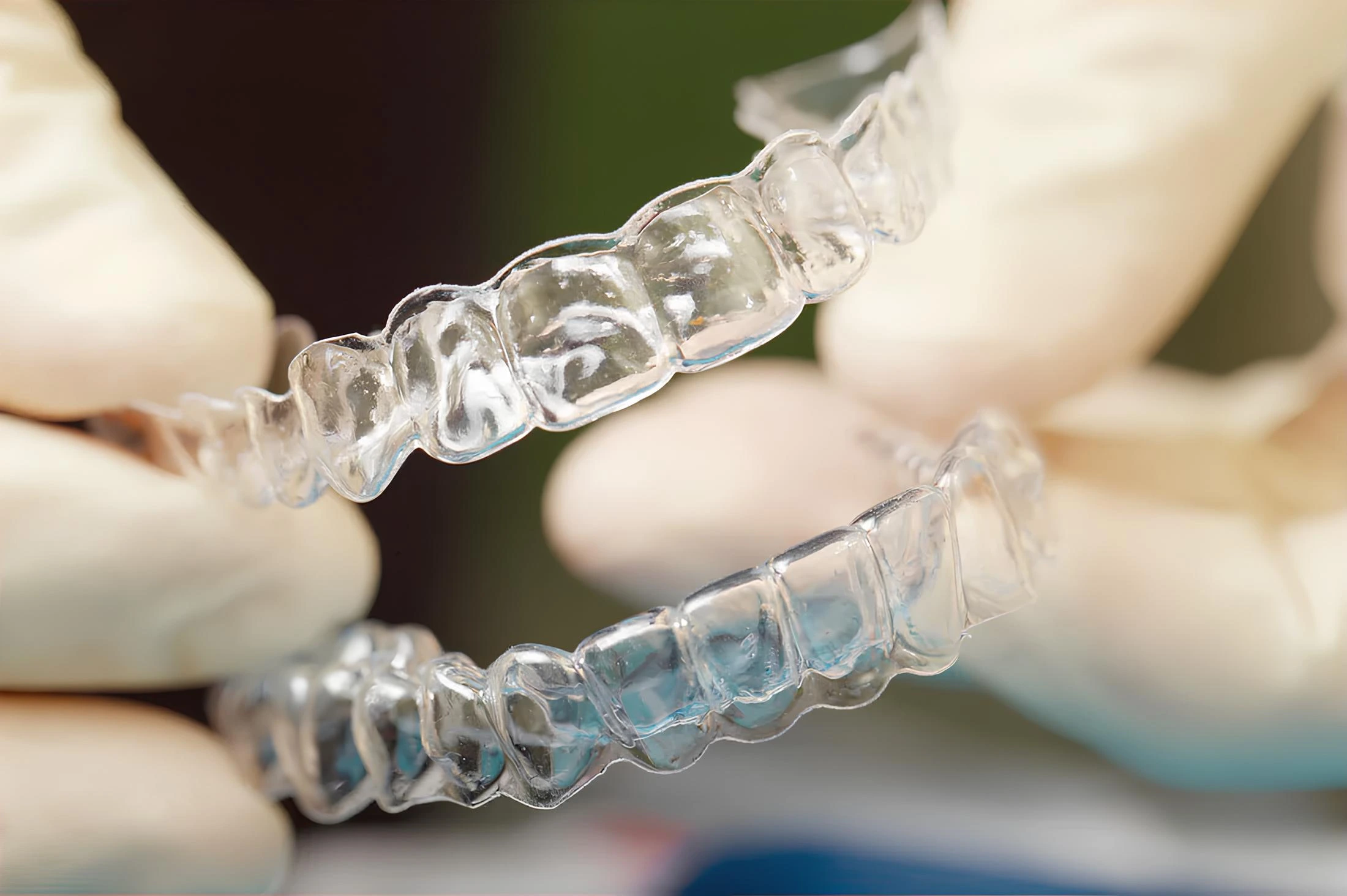Test A custom-fitted night guard is one of the most effective ways to protect your teeth and gums from the damage caused by grinding or clenching during sleep. Unlike store-bought options, it’s designed specifically for your bite, ensuring a precise fit that feels comfortable and secure. This snug fit not only prevents enamel wear and tear but also helps cushion the jaw joints, reducing muscle tension and morning discomfort.
When you grind your teeth, the excessive pressure can lead to gum irritation, tooth sensitivity, and even small fractures. A professionally made night guard creates a barrier between the upper and lower teeth, absorbing the force and preventing long-term dental complications. It also allows your jaw muscles to relax, giving you a more restful night’s sleep.
Investing in a custom-fitted night guard isn’t just about comfort; it’s a proactive step toward preserving your oral health and maintaining a strong, healthy smile for years. By minimising the risk of tooth wear, gum irritation, and jaw strain, it supports overall dental wellbeing.
Understanding Bruxism and Teeth Grinding
Bruxism (night-time teeth grinding) is surprisingly common. Many people grind their teeth involuntarily while asleep. You might not notice it yourself, but a partner may hear a grinding noise, or you could wake with a headache, jaw pain, or tooth sensitivity. According to Australian health guidelines, about half the population clenches or grinds their teeth occasionally, and roughly 5% grind forcefully regularly. In short, you are not alone if this happens to you.
Repeated grinding can lead to cracked enamel, worn-down teeth, and sore gums. Over time, the damage is cumulative: tiny fractures in enamel can form, fillings may break, and gum tissue can be irritated by aggressive biting. Your dentist will check for these signs at routine check-ups. This is why it’s important to mention any morning jaw pain or related symptoms. But prevention is key. One treatment approach is a mouthguard or splint to protect your teeth. In practice, this means wearing a night guard while you sleep so that the plastic takes the brunt of grinding, not your precious teeth and gums.
What Is a Custom-Fitted Night Guard?
A custom-fitted night guard (sometimes just called a night guard or custom-fit mouthguard) is a dental appliance made from an impression of your teeth. Unlike generic guards you might buy off the shelf or the boil-and-bite kinds that soften in hot water, a custom guard is sculpted to match your dental arches exactly. This precision fit makes a huge difference in comfort and effectiveness. In fact, health authorities emphasize the benefit of custom guards: a custom-made mouthguard (known as an occlusal splint) to protect your teeth in cases of bruxism.
A custom-fitted night guard is molded from impressions of your teeth to ensure a snug, comfortable fit. When worn, it absorbs grinding forces, guarding your enamel and gum tissue.
Because a custom guard matches your bite exactly, it sits steadily on your teeth without shifting. Imagine having a soft, contoured cushion between your dental arches. When your jaw muscles clench during sleep, the pressure is distributed evenly across the guard. This protects individual teeth from cracking or chipping. It also takes the strain off your jaw joints (TMJ) and facial muscles, often reducing morning stiffness and soreness. In short, it’s like giving your teeth a plush pillow at night.
Benefits of a Custom-Fitted Night Guard
Custom-fitted night guards offer several key advantages over generic versions. In a nutshell, they protect your smile more reliably and comfortably. Key benefits include:
Precision Fit and Comfort: Since a dentist or lab makes it just for your mouth, there’s minimal bulk. You can close your jaw naturally. A snug fit also reduces saliva buildup and speaking interference. Think of it as wearing someone else’s shoes versus your exact size; only the latter feels just right.
Maximum Protection: The one-piece acrylic used in custom guards is usually thicker and more durable than over-the-counter types. Clinicians agree that a dental splint guards the teeth from grinding. By absorbing impact, the guard prevents the biting forces from reaching the tooth enamel and gums. This dramatically lowers the risk of cracks, chips, or gum injuries.
Better for Gums: A well-made guard also covers the gum line along your teeth. This means your soft tissues are shielded from the aggressive pressure of nightly clenching. By preventing direct trauma, the guard helps keep your gums healthier.
Durability: Custom guards can last for years if cared for properly, making them a sound investment. Off-the-shelf guards often wear out faster, losing their fit and protection quality sooner.
Jaw Muscle Relief: Beyond your teeth, bruxism can strain jaw muscles and joints (TMJ). A custom guard reduces muscle fatigue and can ease jaw tension. Many wearers report waking up with less jaw pain after a few nights of use.
Comfort, Fit, and Adjustment Tips
Even with a perfect mold, a new night guard takes a little getting used to. You may notice increased saliva or a minor pressure sensation for the first few nights. This is normal; think of it as “breaking in” a new appliance. Many people say it feels strange at first, like having something in their mouth during sleep. However, it should never hurt.
Here are some tips if you experience night guard discomfort or tightness:
- Give it time to break in: Wear the guard every night for at least a week. Your mouth muscles will gradually adapt. (It’s similar to adjusting to new shoes or eyeglasses.)
- Short naps to start: If full nights are tough at first, try wearing the guard for a nap or a few hours before bed. This can help you adapt gradually.
- Check for hotspots: If a specific tooth or gum is sore, mention it at your next dental appointment. A dentist can lightly adjust or trim the guard where needed.
- Don’t force it: Avoid chewing aggressively on the guard or bending it; this can distort the custom fit. (Some off-the-shelf guides advise very light biting to improve mold, but with a custom guard, it’s better to let the dentist handle any changes.)
- Comfort aids: Over-the-counter pain relief can help if your jaw feels stiff, but only use these sparingly. The key is that major pain is a sign that something’s off. If discomfort persists beyond a few nights, book a check-up.
Ultimately, a custom guard should feel snug yet comfortable. You should be able to easily take it out in the morning. If you wake up with it still in your mouth repeatedly, it’s probably fitting just right. But if it keeps falling out, it may be too loose or the wrong size. Let your dentist know. A properly adjusted guard should preserve your peace of sleep, not ruin it.
Cleaning and Care: Night Guard Hygiene Tips
Just like your teeth, your night guard needs daily care to stay safe and odor-free. Bacteria can lurk in crevices, so a simple rinse isn’t enough. Follow these cleaning tips to keep your guard fresh:
Rinse Immediately: After taking it out in the morning, rinse the guard under cool or lukewarm tap water to remove saliva and debris.
Brush Gently: Use a soft toothbrush and a mild soap or non-abrasive toothpaste to gently scrub the guard. Avoid anything with whitening agents or harsh chemicals; these can damage the material.
Soak Periodically: Once a week, soak the guard in a solution (your dentist might recommend a denture-cleaning tablet or a retainer cleaning solution) to kill germs. Follow the product instructions. Do not use hot water or boil it; heat can warp the custom fit.
Air-Dry Between Uses: Never put a wet guard back into its case. Instead, let it air-dry completely on a clean surface before storing. This helps prevent mold or bacterial growth.
Use a Ventilated Case: Store the guard in its protective case when not in use. The case should have holes for airflow. Keep the case clean too, wash it weekly with soapy water.
Avoid Sunlight and Heat: Do not leave your guard in direct sunlight or a hot car. High temperatures will distort the plastic and ruin the fit.
By following a simple routine, you’ll extend the life of your night guard and protect your oral hygiene. Good care not only prevents odors and stains but also ensures that the guard continues to function properly against bacteria that could hurt your gums or teeth.
When to Replace Your Night Guard
Even the best-made night guards wear out eventually. Keep an eye out for these signs that it’s time for a replacement:
Visible Damage: If you see cracks, tears, or holes in the plastic, the guard can no longer protect you properly. Even small splits can harbor bacteria or fail under pressure.
Warping or Loss of Shape: A distorted guard that no longer fits snugly is ineffective. If it feels loose or the fit feels different, it won’t cushion your bite as intended.
Persistent Discomfort: If your guard suddenly starts pinching or shifting when it never did before, it may have warped, or your bite may have changed.
Staining or Foul Odor: Over time, even with good cleaning, the material can become permanently discolored or start to smell. While not inherently harmful if cleaned, these can be signs of deep-set bacteria.
Dental Changes: If you’ve had major dental work (new crowns, braces removed, etc.) or your natural bite has changed, your old guard won’t fit correctly anymore.
Regular Replacement Schedule: As a rule of thumb, many dentists suggest getting a new night guard every 2–3 years, even without obvious damage. Materials fatigue over time, and a fresh guard means optimal protection.
Keep track of how long you’ve used your guard. If you can’t remember the last time it was replaced, ask your dentist at your next visit. They can check its condition and your wear pattern. Remember, a worn-out guard offers false protection; it may give you a sense of security, but it isn’t keeping your teeth safe.
Conclusion
A custom-fitted night guard plays a crucial role in safeguarding your teeth and gums from the harmful effects of grinding, clenching, and jaw tension. Unlike generic guards, it’s crafted to fit your mouth perfectly, offering superior comfort and protection. This precision design ensures your enamel, gums, and jaw muscles are shielded from unnecessary stress while you sleep, allowing you to wake up refreshed and pain-free.
By preventing tooth wear, gum irritation, and jaw discomfort, a custom-fit night guard supports long-term oral health and comfort. With proper cleaning, maintenance, and timely replacement, it continues to provide reliable protection for years. It’s a simple yet effective solution for anyone struggling with bruxism or nighttime clenching.
If you’re experiencing jaw soreness, tooth sensitivity, or signs of grinding, it’s time to take action. At Raceview Complete Denture Care, we provide expert custom night guard solutions and customised denture solutions. Book an appointment today to protect your smile and enjoy lasting oral comfort.
FAQs:
What exactly is a custom-fitted night guard?
It’s a dental device made from molds of your teeth. After a dentist takes impressions of your bite, a lab fabricates a clear acrylic guard that fits your teeth perfectly. Unlike generic guards, it matches your mouth’s unique shape for maximum comfort and protection. Essentially, it’s a tailored mouthguard that you wear only during sleep to prevent grinding damage.
How do I clean and care for my night guard?
Clean it every morning! Rinse it under cool water, then gently brush it with a soft toothbrush and mild soap or non-whitening toothpaste. Soak it weekly in a denture- or retainer-cleaning solution if recommended. Always let it air-dry completely before storing it in its case. Avoid hot water and harsh chemicals, as these can warp or weaken the guard.
How will I know if my night guard needs replacing?
Watch for wear-and-tear. If the guard has cracks, a loose fit, or becomes uncomfortable, it’s time for a new one. Also, replace it if you notice stains or persistent odors that don’t wash away. Many people get a fresh custom guard every couple of years. Your dentist can advise you based on how much grinding you do and the guard’s condition.


